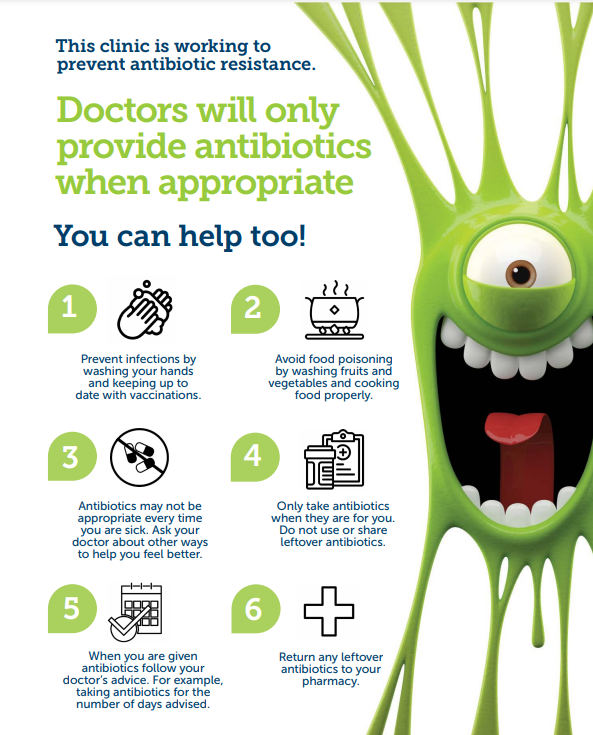Fungal Infections: A Growing Threat Of Antibiotic Resistance

Table of Contents
The Rise of Antifungal Resistance
The development of antifungal resistance is a complex issue with far-reaching consequences. Understanding the mechanisms behind this resistance is crucial to developing effective countermeasures.
Understanding Antifungal Resistance Mechanisms
Fungi, like bacteria, develop resistance through several mechanisms. These include:
-
Target modification: Fungal pathogens can alter the target site of antifungal drugs, rendering the medication ineffective. For example, Candida albicans, a common cause of candidiasis, can modify its cell wall components, reducing the effectiveness of echinocandin antifungals.
-
Efflux pumps: These pumps actively transport antifungal drugs out of the fungal cell, preventing them from reaching their target and impacting their function. This mechanism is common in Aspergillus fumigatus, a leading cause of invasive aspergillosis.
-
Reduced drug permeability: Changes in the fungal cell membrane can reduce the entry of antifungal drugs into the cell, thus limiting their efficacy. This is often observed in various Candida species.
Overuse and misuse of antifungals significantly contribute to the emergence and spread of resistance. The widespread use of broad-spectrum antifungals in agriculture and medicine creates selective pressure, favoring the survival and proliferation of resistant strains. Genetic factors also play a significant role, with certain fungal genotypes being inherently more prone to developing resistance. Understanding these complex interactions between environmental factors and genetics is crucial in the fight against antifungal resistance.
Impact of Antifungal Resistance on Healthcare
The consequences of antifungal resistance are severe, placing a significant burden on healthcare systems worldwide.
Increased Mortality and Morbidity
Resistant fungal infections lead to increased mortality and morbidity rates. Patients with infections caused by resistant fungi experience prolonged illness, requiring extended hospital stays and more intensive care.
-
Studies show significantly higher mortality rates for patients with infections caused by resistant Candida auris compared to those with infections caused by susceptible strains.
-
The cost of treating resistant fungal infections is substantially higher than treating susceptible infections, due to the need for more expensive and often less effective therapies.
-
Immunocompromised individuals, such as those with HIV/AIDS, organ transplants, or cancer, are particularly vulnerable to serious fungal infections and are at increased risk of complications from resistant strains. The healthcare burden is amplified by the prolonged hospital stays and increased risk of mortality associated with these resistant infections.
Preventing the Spread of Antifungal Resistance
Preventing the spread of antifungal resistance requires a multi-pronged approach focusing on responsible antifungal use and robust infection control measures.
Responsible Antifungal Use
Implementing effective antifungal stewardship programs is critical. This involves:
-
Reducing unnecessary antifungal use: Promoting diagnostic testing to ensure appropriate antifungal therapy and avoiding prophylactic use unless absolutely necessary.
-
Improving infection control practices: Strict adherence to hygiene protocols in healthcare settings and proper disposal of contaminated materials to prevent the spread of resistant fungi.
-
Developing and implementing rapid diagnostic tests: Quick and accurate identification of fungal pathogens and their susceptibility to antifungals is crucial for guiding appropriate treatment and preventing the spread of resistance. This helps minimize the use of broad-spectrum antifungals, thus reducing the selection pressure for resistant strains.
The Search for New Antifungal Therapies
The urgent need for new antifungal therapies is driving significant research and development efforts.
Research and Development Efforts
Developing new antifungal drugs is a challenging but essential undertaking.
-
Several promising antifungal agents are currently undergoing clinical trials, targeting novel fungal pathways and mechanisms.
-
The inherent challenges in antifungal drug development include toxicity concerns and the difficulty in targeting fungal cells without harming human cells.
-
Exploring alternative therapeutic approaches, such as immunotherapy or combination therapies using existing drugs in novel combinations, offers potential avenues for combating resistant fungal infections. Immunotherapy holds promise by harnessing the body's own immune system to fight the infection. Combination therapies could potentially overcome resistance mechanisms by using multiple drugs targeting different fungal pathways.
Conclusion
The rise of antifungal resistance poses a grave threat to global health, leading to increased mortality, morbidity, and healthcare costs. The impact is particularly severe for vulnerable populations. Preventing the spread of resistance requires a concerted effort focusing on responsible antifungal use, robust infection control practices, and the development of new antifungal therapies. Understanding the growing threat of fungal infections and supporting research into new treatments is crucial. Learn more about responsible antifungal use and advocate for better infection control practices to help mitigate the growing threat of antifungal resistance.

Featured Posts
-
 The Unexpected Rise Of Counting Crows After Saturday Night Live
May 08, 2025
The Unexpected Rise Of Counting Crows After Saturday Night Live
May 08, 2025 -
 Dojs Proposed Google Changes A Threat To User Trust
May 08, 2025
Dojs Proposed Google Changes A Threat To User Trust
May 08, 2025 -
 Lotto And Lotto Plus April 12 2025 Results
May 08, 2025
Lotto And Lotto Plus April 12 2025 Results
May 08, 2025 -
 5 Military Movies Blending Heart And Action Warfare On Screen
May 08, 2025
5 Military Movies Blending Heart And Action Warfare On Screen
May 08, 2025 -
 Xrp Price Prediction Is A Parabolic Move Imminent Remittix Ico Update
May 08, 2025
Xrp Price Prediction Is A Parabolic Move Imminent Remittix Ico Update
May 08, 2025
Latest Posts
-
 Breaking Bread With Scholars Strategies For Successful Academic Networking
May 08, 2025
Breaking Bread With Scholars Strategies For Successful Academic Networking
May 08, 2025 -
 Meaningful Dialogue Breaking Bread With Scholars In Academia
May 08, 2025
Meaningful Dialogue Breaking Bread With Scholars In Academia
May 08, 2025 -
 Breaking Bread With Scholars A Guide To Meaningful Academic Discussion
May 08, 2025
Breaking Bread With Scholars A Guide To Meaningful Academic Discussion
May 08, 2025 -
 Pakistan Super League 10 Ticket Information And Purchase
May 08, 2025
Pakistan Super League 10 Ticket Information And Purchase
May 08, 2025 -
 Psl 10 Ticket Sales Starting Today
May 08, 2025
Psl 10 Ticket Sales Starting Today
May 08, 2025
